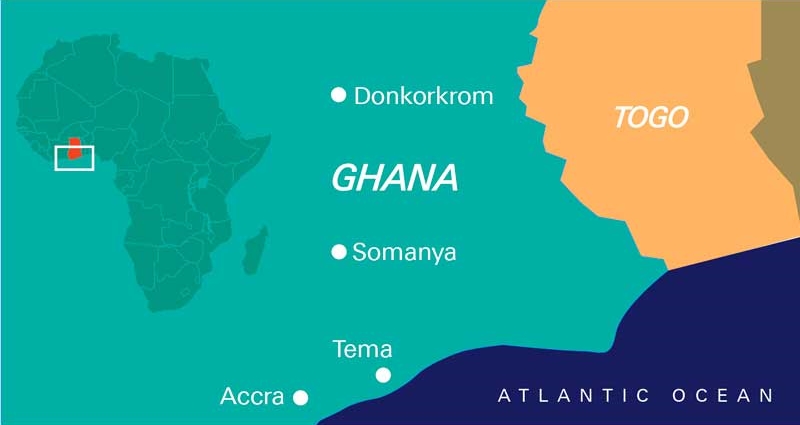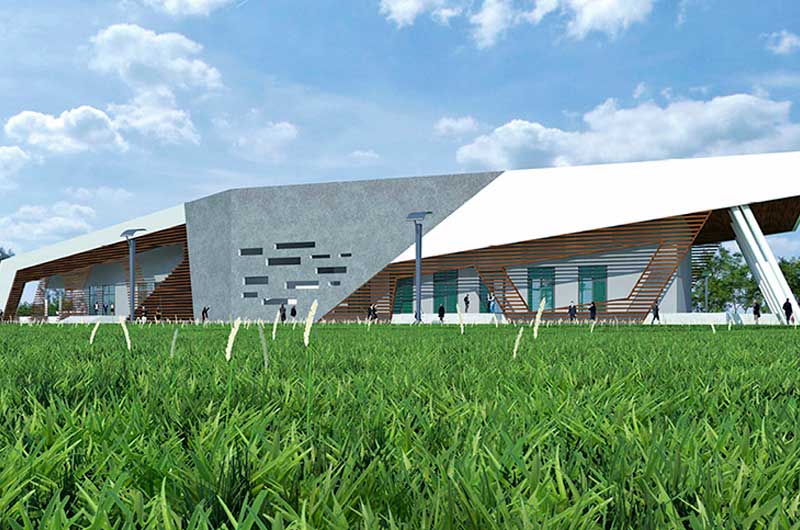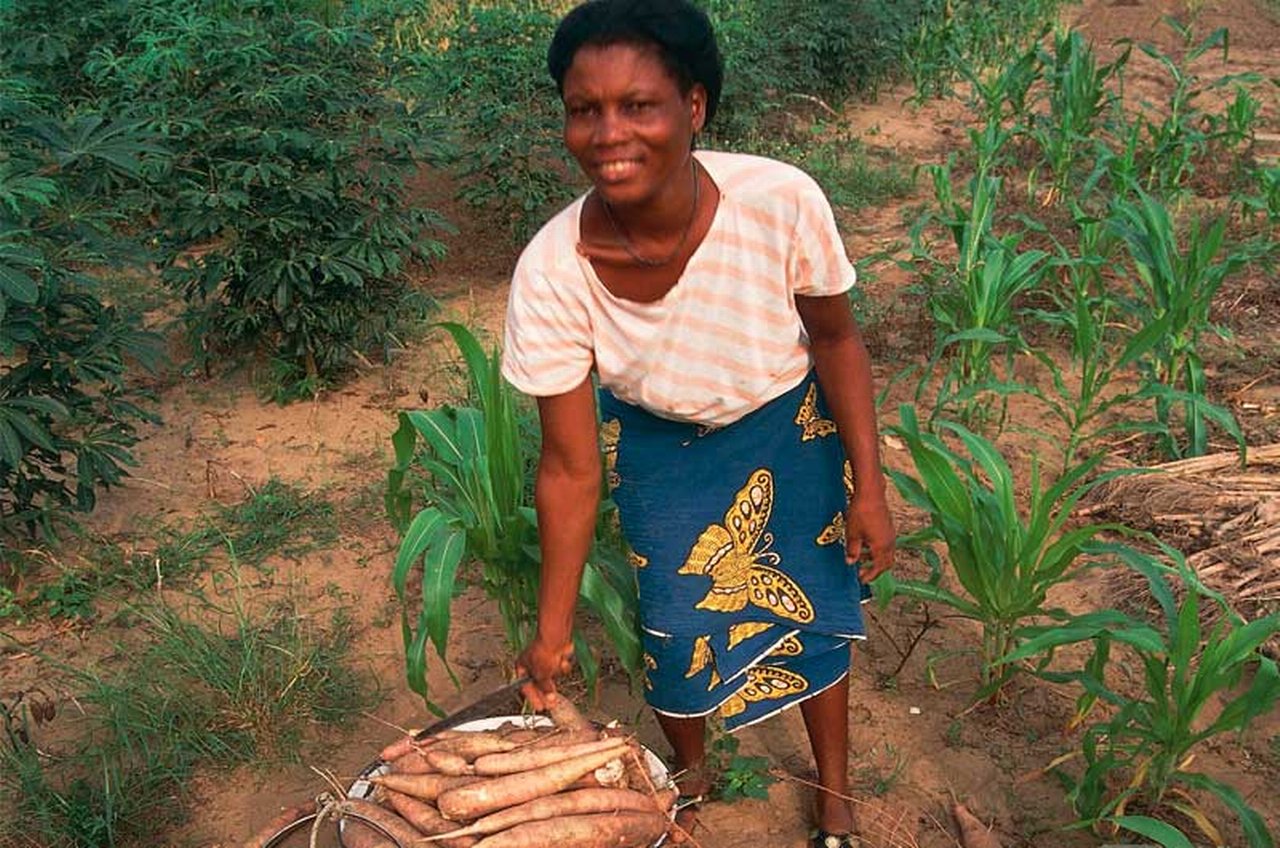October 2018
Ghana’s dependence on raw commodity exports has done little for its economy or its food security. It still imports most staple foodstuffs. flow reports on how export credit agency financing is building a university dedicated to sustainable development and agribusiness
At number 139 out of 188 nations in The Human Development Index (2016)1, the discovery of oil has not changed the fact that the World Food Programme classifies Ghana as a low-income, food-deficit country.
While the exports of gold, oil and cocoa have underpinned strong GDP growth in recent years, this West African country’s dependence on raw commodity exports became painful when commodity prices tumbled. The fiscal deficit deteriorated and public debt was standing at 74% of GDP by the close of 2016.
Changing mindsets
With 27 million people to feed, agriculture has become a priority for the government – you can’t feed a nation on cocoa. The entire continent still spends a massive US$50bn a year on food imports, notes the Food and Agriculture Organization of the United Nations (FAO)2. Although farming accounts for 37% of Ghana’s GDP, this is spread out across myriad one- to two-hectare smallholder farms.
Agriculture forms the basis for pulling the nation out of poverty and attaining appreciable economic growth
David Asare Asiamah, Founder and CEO of Agro Mindset
Another issue is the attitudes of young Ghanaians to farming as a career. An academic study based on interviews with students attending high schools in Tepa and Savelugu was published in Food Security journal (February 2017)3 and notes that farming is regarded by many of them as old-fashioned and as a job that commands little respect. As one 18-year-old from Tepa told researchers, “Farmers are not respected in society compared to jobs like a medical doctor ... the public needs to be educated to orientate young people and others to farming.” Another respondent said, “Young people think farming is dirty work so they want to be in the city for modern jobs.” The paper concludes, “The challenge is not so much how to get young people interested in agriculture, but how to make agriculture worthy of their attention.”
 One entrepreneur, David Asare Asiamah, founder and CEO of Agro Mindset4, has done just that by setting up an agriculture education programme in Ghana. He trained at conservation farms in the UK between 2009 and 2014, learning new skills in agricultural production and marketing, completing his postgraduate studies at the University of Reading5. As he explains, “Agriculture forms the basis for pulling the nation out of poverty and attaining appreciable economic growth. This includes provision of raw materials, foreign exchange, and a market for the local agricultural industry.”
One entrepreneur, David Asare Asiamah, founder and CEO of Agro Mindset4, has done just that by setting up an agriculture education programme in Ghana. He trained at conservation farms in the UK between 2009 and 2014, learning new skills in agricultural production and marketing, completing his postgraduate studies at the University of Reading5. As he explains, “Agriculture forms the basis for pulling the nation out of poverty and attaining appreciable economic growth. This includes provision of raw materials, foreign exchange, and a market for the local agricultural industry.”
A modern approach
While Asiamah has been something of a beacon, engagement of the next generation of farmers needs more traction. Well aware of the poor press farming has as a career, the government is tackling this by repositioning agriculture as a vocational science.
The Ministry of Finance clarified in its 2017 financial statement6 that it exists “to promote sustainable agriculture and thriving agribusiness through research and technology development, effective extension and other support services to farmers, processors and traders for improved livelihood”. It went on to state that its goal for the next four years is “to modernise agriculture, improve production efficiency, achieve food security and profitability of our farmers, all aimed at significantly increasing agricultural productivity”.
In particular, it launched the “Planting for Food and Jobs” campaign, designed to encourage urban and rural citizens to take up farming as a full- or part-time activity, along the lines of the “Operation Feed Yourself” programme in the 1970s. Priority crops are maize, rice, sorghum and vegetables, with other crops to be adopted in subsequent years.
Financial support
In 2015, the International Monetary Fund (IMF) granted Ghana a three-year extended credit facility for US$918m. This was agreed on the basis that Ghana implemented reforms aimed at limiting its fiscal and current account deficits.7 Acting IMF Deputy Managing Director and Chair Min Zhu said that “a prudent borrowing strategy will be needed to ensure that financing needs are met at the lowest possible cost”. The fund’s support, noted Euler Hermes in 2017, “has restored some investor confidence and helped sovereign bond assurances”8.
Priority projects approved by the Ghanaian Government qualify for a proportion of the IMF funding, and this included the establishment of a public university in the Eastern region of Ghana – the road map for which was launched by then-President, John Dramani Mahama, on 17 April 2013. In 2014 a bill was submitted to Parliament, which was approved and endorsed by the president and then Parliament in 2016. The current president, Nana Akufo-Addo, confirmed his support for the project when he took office in January 2017.
Centre of excellence
The University of Environment and Sustainable Development positions itself as the first African university entirely dedicated to agrarian and environmental sciences. Its objective, once completed, is not only to help create hundreds of jobs and drive the economic and social development of the country, but also to become a reference point for international academic work in the field of food security and sustainable development. In other words, once up and running and positioned as a hub of excellence, it will help change the negative attitudes of young people towards farming. “Dirty work” morphs into a respected science, akin to medicine.
Construction was planned in two phases, with a main campus in Somanya (under phase I) and a branch sited in Donkorkrom (under phase II) in south-eastern Ghana. The project had to align with the overall goal of sustainable development, using technologies such as biogas generation, rainwater harvesting, green and solar-panelled roofs and other energy efficient building systems across both campuses of the university.
US$50bn
The amount Africa spends each year on food imports (Food and Agriculture Organization)
Investment in education, particularly in the agricultural and environment sectors … is one of the most powerful development tools
Simon Sayer, Managing Director of Structured Export and Trade Finance, Deutsche Bank
But how was a country already on a strict fiscal reform agenda going to pay for it? Deutsche Bank’s Milan-based Vice President of Structured Trade and Export Finance (STEF), Riccardo Rocchio, reflects, “Clearly, Ghana is in need of financing and they are creating differentiated social financing and developing export credit agency (ECA) solutions as an alternative to bonds – they are growing this instrument.” Ghana’s Ministry of Finance confirmed ECA finance as a key borrowing and finance strategy, listing “optimising non-concessional and external financing (emphasis on ECAs)” in a roadshow presentation entitled “Ghana’s path to economic transformation” given in December 2017.
The Italian job
 A computer image of the new University of Environment and Sustainable Development campus in Somanya, Ghana
A computer image of the new University of Environment and Sustainable Development campus in Somanya, Ghana
The Ghanaian Government was not new to ECA finance, and in 2014 Deutsche Bank had already worked with Brazilian construction company Contracta Engenharia Ltda to arrange a US$172m ECA financing to fund the renovation of Ghana’s Kumasi Market, the largest open-air market in West Africa. US$135m of this was guaranteed by the Brazilian export agency, ABGF, because of the flow of Brazilian goods and services. Contracta had established a foothold in Ghana with the successful completion of an aircraft hangar project in 2012 and, having demonstrated competence and capability to the Ghanaian Government, had built its reputation from there.
Contracta Engenharia had been ramping up its overseas activities to diversify sales away from Brazil during the economic downturn there, and now has subsidiaries in Ghana, the UK, Italy and the Bahamas.
In the meantime, the Italian bank CDP Group, now managing the activities of export credit agencies SACE and SIMEST, had been showing particular interest in supporting trade with emerging Africa. According to Rocchio, SACE had available lines for Ghana that were waiting for the right project. The Deutsche Bank team and Contracta visited and worked with the agency to explain the opportunity to the Italian SME exporters that Contracta wanted to award technology, machinery, vehicles, and other materials subcontracts to. Without ECA cover these SMEs would not normally take the risk of exporting to West Africa. “Africa represents a strategic market for Italian exports and the financing of big projects in the area is decisive for the award of new contracts to Italian companies,” observed SACE’s Chief Sales Officer, Simonetta Acri.
Structuring the deal
In December 2016, Contracta Costruzioni Italia Srl signed a €45.6m engineering, procurement and construction (EPC) contract with Ghana’s Ministry of Education for both the design and build of the new University of Environment and Sustainable Development and the related infrastructure in Somanya.
At the same time, the Deutsche Bank STEF team were mandated by the Ministry of Finance to structure a financing package for 100% of this project amount. As arranger and agent, Deutsche Bank put together a buyer’s credit facility of €45.6m supported by the Italian export credit system in the form of €38.7m in SACE and SIMEST covered financing, with the balance of €6.8m in a commercial loan.
Signed in May 2017, the SACE element comprised a 12-year tenor made up of a two-year grace period and a 10-year repayment schedule, with the first repayment starting in month 30. The commercial loan was for five years and comprised a six-month grace period and a four-and-a-half-year repayment period, with the first repayment triggered in month 12.
The positive impact on all the communities involved, linking know-how to excellence from various sectors and from three continents with a vision for sustainable development, was particularly satisfying, says Paolo Maestri, Co-Head of Corporate Finance Italy and Head of Global Transaction Banking Italy at Deutsche Bank.
Progress so far
President John Dramani Mahama “cut the sod” for the construction of the university in a ceremony held on 30 December 2016, and work began on the 521-hectare site of the Somanya Campus in January 2018. In an interview that appeared in various Ghana newswires, Accra-based Professor Kwesi Yankah, Minister of State in charge of Tertiary Education, confirmed that the workforce would comprise 10% expatriates who had arrived to work alongside local architects and that “nobody should entertain any fear of importing a workforce from elsewhere”. He also confirmed that construction had been delayed because of technical issues which had since been resolved, and that the university should be completed by mid-2019.9

The new University of Environment and Sustainable Development aims to transform agriculture in Ghana

Investment in education, particularly in the agricultural and environment sectors that have such relevance for Ghana, is, says Deutsche Bank’s Managing Director of Structured Export and Trade Finance Simon Sayer, “one of the most powerful development tools”. He concludes, “We are delighted to be assisting in this project for a new university that will be dedicated to these fields of higher education.”
Sources
1 See https://wfp.org/ at wfp.org
2 See https://bit.ly/1LnypQF at fao.org
3 See https://bit.ly/2Ax2TE2 at springer.com
4 See http://www.agromindset.com/ at agromindset.com
5 See https://bit.ly/2vrbdzf at mynaijanaira.com
6 See https://bit.ly/2LUZ3cj at mofep.gov.gh
7 See https://bit.ly/2Kh4RrN at imf.org
8 See https://bit.ly/3O8cNwG at eulerhermes.com
9 See https://bit.ly/2Aw8H0v at peacefmonline.com
